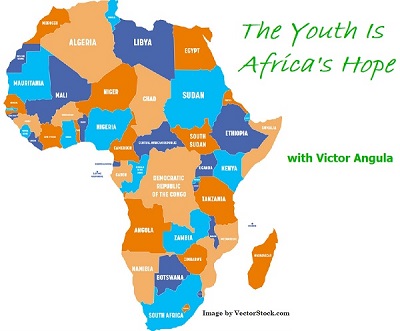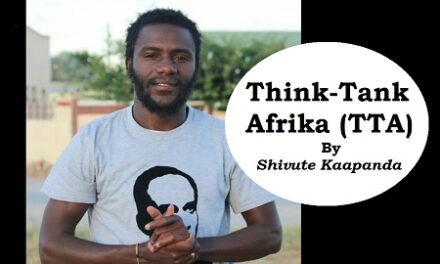The Youth Is Africa’s Hope
By Victor Angula /
In 1957 Ghana became the first African country in sub-Sahara to achieve independence from European colonialism. Within the next decade almost all of the nearly fifty African states gained their independence from foreign-rule; and finally it was Namibia in 1990 and South Africa in 1994 who also managed to remove the yoke of racist white-rule – apartheid.
And the advent of the nineties ushered in a great wave of multi-party parliamentary democracies, a really good and welcome wave after the post-colonial decades of politics characterized by one-party rule, military-rule, and dictatorships across the continent.
But all across the length and breadth of the continent, from Cape to Cairo, from Dakar to Djibouti, our continent has continued to decline economically, politically, socially, culturally, and even morally during the period of self-rule. Today most of the continent is underdeveloped, there is high illiteracy, children are malnourished, people have lack of access to clean drinking water, and communities are wallowing in poverty.
Which is an indication that throughout all those decades of self-rule, or majority-rule, most of the continent has just been groping around in the darkness. Instead of making our countries to flourish, initiate a general and steady rise in the standard of living of our people, and bring about economic progress in our societies, we have failed shamefully.
Today Africa is groaning pitifully under the weight of foreign debt. And everyone knows that there is no hope at all for Africa’s survival.
Political freedom was gallantly won. But everything else that was attempted after that, in order to develop the continent and ensure economic freedom, was an abysmal failure. Africa has been called a “black continent” where no progress is possible. Africans have long been dismissed as people incapable of running modern-day states, and a wreath of shame was placed on the continent.
It is a disgrace, an embarrassing display of the inexplicable inability of the peoples of this great continent to govern themselves.
So that a glance at the historical map of post-colonial Africa shows how the continent went groping around in the darkness, unable to organize or reorganize itself. In most parts of Africa after colonization the course of events led to no better future for men, women, and children, who were just liberated, but doubled back towards the unheard of miseries.
In some parts of Africa no sooner had the imperialists withdrawn and their ugly footprints effaced than the new states plunged into chaos, civil war, tribal conflict, and accompanying bloodshed as the newly liberated peoples turned against each other. Governments killed their own citizens without regret, killing even more than the colonial governments had killed.
The promises of better housing, education for all, employment opportunities, and material wealth disappeared with the wind as African leaders – the liberators – throttled the opposition, killed human rights activists and entrenched themselves in one-party states.
Decades of political instability, widespread corruption and mismanagement of the economy have seen many an African country squander its rich natural resources – and so blow away its destiny.
Today here we are; standing 20 years past the threshold of the 21st century. But widespread poverty, rampant disease epidemics, puzzling political immaturity, the evils of tribalism, and bloodshed that have marked Africa throughout the 20th century are with us.
The decay is continuing, people dying as a result of civil wars, political conflicts, starvation, crime and diseases, so much so that it seems that Africa is simply a continent that has been doomed. Forever.
Fortunately there is a way out. There is really one good way of turning the matters around and manage to drag this great continent out of its suicidal state. There is only this one answer to Africa’s woes.
The youth.
The youth is Africa’s only hope. The young people of this great continent should only get hold of the reins, then we shall be galloping towards progress, development and economic independence.
I am hasty to add that this getting hold of the reins to steer the continent in the right direction is not to merely wrest power from political leaders. It is to take charge of work – to have an active part in every economic activity of the country.
In many countries the political leaders have been trying their best, but since the youth is not made part of the development programmes, this is where such attempts inevitably fail to produce results. Africa devised programmes from time to time, good programmes with noble intentions, programmes seen as the vehicles that would lead the continent out of the mire. (Can anyone remember NEPAD?)
But such types of programmes tend to die quietly all by themselves because any programme which fails to take the youth on board, not merely as passengers, but as part of the crew, then this vessel will inevitably sink and be forgotten in a few years’ time.
Any plan or programme to resuscitate the continent can be good, just as good as all those ideas and plans which were conceived and devised all those many years after colonization. But for it to achieve its goals the complete participation of young people in every one of its endeavors, in every country, is necessary.









